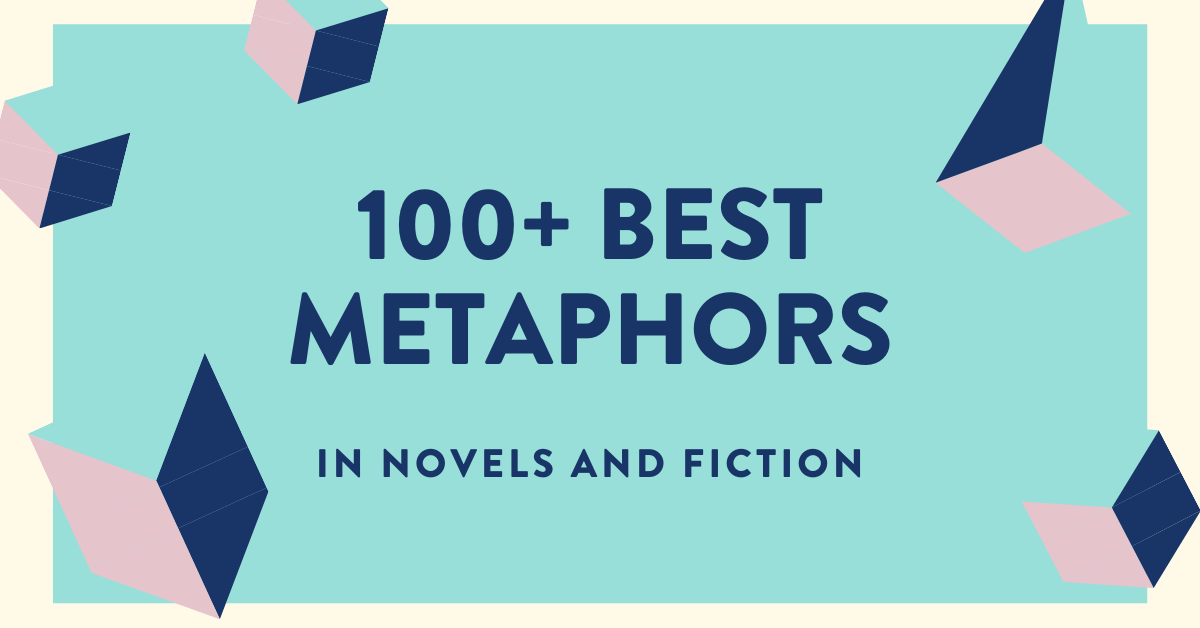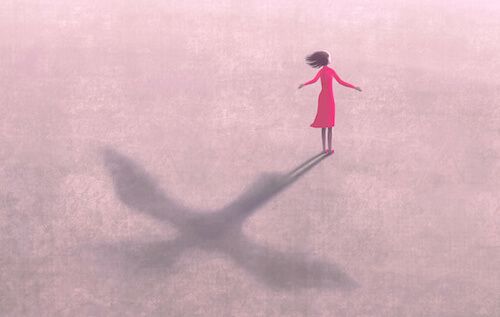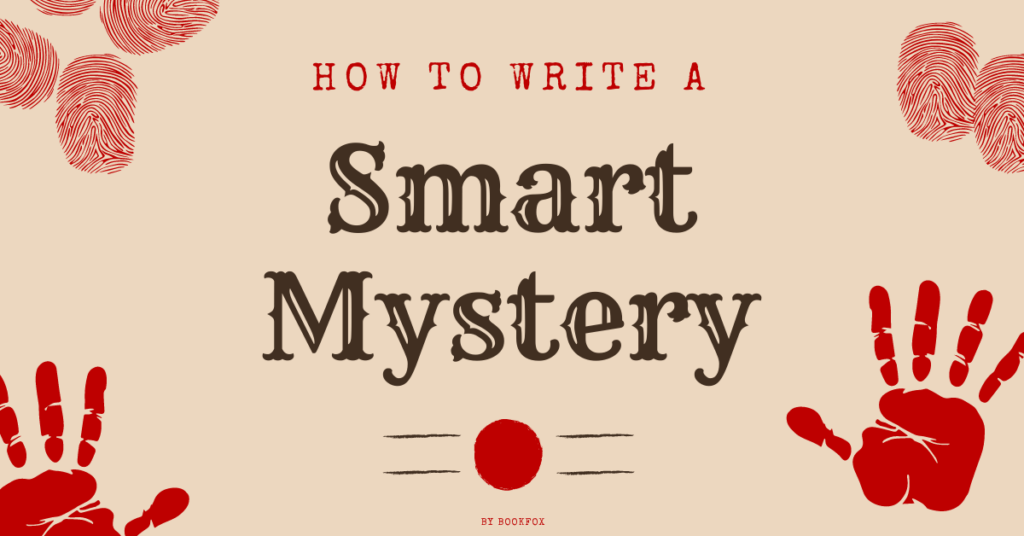
A great metaphor will have distance between the metaphor and the original object.
It’s very important that they’re unlike. The more different your metaphors are from the thing described, the more surprising they will be, and the more they will help your reader to understand.
Metaphor Mistakes
- Highly similar metaphors. For instance, “a pool in a cave is like an underground cavern filled with water” is a bad metaphor, because those two things are exactly alike. That’s not a metaphor, that’s merely redundant. Even “his bubble gum expanded like a balloon” is far too similar.
- Common metaphors. Have you ever heard the comparison before? Then it’s not a good metaphor, it’s a tired, overworked metaphor, also known as a cliche. You have to create a new connection between two unlike things.
- Superfluous metaphors. Sometimes a metaphor is written so the author can show off or sound fancy. Write metaphors with the reader in mind. Will this help them understand or see the object or person better? If not, cut the metaphor.
What is a metaphor? A connection drawn between two unlike things.
Ocean Vuong writes that a metaphor must contain two things:
- A sensory connector between the original image and the transforming image
- A clear logical connector between both images
If you include both those things, a metaphor takes the reader on a journey of discovery.
In the Poetics, Aristotle said that if you have a command of metaphor, it’s a mark of genius. “The greatest thing by far is to have a command of metaphor. This alone cannot be imparted by another; it is the mark of genius, for to make good metaphors implies an eye for resemblance.”
So there has to be some kind of resemblance between the two things. But Aristotle also added that a simile wasn’t as good as an outright metaphor. Similes were metaphors with a preface, and thus substandard.
All due to respect to Aristotle, but I still think similes are brilliant. So there’s a good smattering of them represented in the examples below.
Also, if you like these metaphors, you’ll probably enjoy my list of the 100 most beautiful sentences, so please check those out as well (there’s a good amount of similes/metaphors in that post as well!).
Joe Moran said that “Metaphor is how we nail the jelly of reality to the wall.” So read all the examples below, and then yank out your pen or pencil and start nailing that jelly.
1. Elena Ferrante, “My Brilliant Friend”
“The waves rolled in like blue metal tubes carrying an egg white of foam on their peaks, then broke in a thousand glittering splinters and came up to the street with an oh of wonder and fear from those watching.”
2. Jeffrey Eugenides, “The Virgin Suicides”
“We didn’t remember putting [the photographs] up, but there they were, dim from time and weather so that all we could make out were the phosphorescent outlines of the girls’ bodies, each a different glowing letter of an unknown alphabet.”
3. John LeCarre, “The Spy Who Came In From the Cold”
Here one of the German characters during the Cold War is talking about being tortured:
“The pain just increases like a violinist going up the E string. You think it can’t get any higher and it does–the pain’s like that, it rises and rises…”
4. Patricia Hampl, “Memory and Imagination”
In this piano lesson, we get not one but two wonderful metaphors, both about middle C:
“She emphasized the importance of middle C, its central position, a sort of North Star of sound. I remember thinking,”Middle C is the belly button of the piano.”
5. Raymond Chandler, “The Big Sleep”
Hardboiled detective novels tend to have clipped metaphors. They don’t spill on and on, they are cut and dried. Say it and run (the opposite of the Roberto Bolano metaphor further down this page).
But note well that this metaphor is an improvement upon a cliche: normally, most writers would write the smile was “icy.” That overly familiar metaphor concept is taken and improved upon.
“His smile was as stiff as a frozen fish.”
See more of Chandler’s similes here, including “cold as a nun’s breeches,” and Flavorwire also offers a list of Chandlerisms.
6. Karan Majajan, “The Assocation of Small Bombs”
The narrator is meditating on life and death, trying to find meaning. He’s in the middle of an existential crisis.
It’s wonderful that he chooses an animal metaphor to describe his internal organs, as if to remind the reader that he too is an animal, that he has animal parts and will someday die.
“Inside him, in a broth of blood and water, organs bumped softly, organically into one another, like fish in an aquarium.”
7. Patrick DeWitt, “The Sisters Brothers”
Writing good internal sensations is something that only fiction can do. Movies can’t do it, TV can’t do it, plays can’t do it.
It’s also incredibly difficult not to slip into cliche when you’re describing what’s happening inside a body, but DeWitt pulls off a miracle with this description of anger as a toppled pot of black ink.
“My very center was beginning to expand, as it always did before violence, a toppled pot of black ink covering the frame of my mind, its contents ceaseless, unaccountably limitless.”
8. Cormac McCarthy, “Blood Meridian”
It’s difficult to choose just a single metaphor from Cormac. Just in Blood Meridian alone, there are hundreds of worthy contenders. In fact, over at Bibliokept, they have a (long!) list of all of them, so please peruse at your pleasure.
But I’m listing this metaphor because it’s a view of the natural world, which he excels at describing.
“They crossed a vast dry lake with rows of dead volcanoes ranged beyond it like the works of enormous insects.”

9. Katherine Anne Porter
“‘My little wife,’ murmured the Professor, as he had done after the long exhilarating siege of deflowering her on their wedding night.”
10. Sally Rooney, “Normal People”
There’s echoes of the end of James Joyce’s “The Dead” in this line, with the pessimistic description of snow falling.
This is also a simile that shows the inner mental state of the person watching the snow, to see snow as a series of very small mistakes.
“Outside her breath rises in a fine mist and the snow keeps falling, like a ceaseless repetition of the same infinitesimally small mistake.”
11. Colson Whitehead, “The Underground Railroad”
It’s important to remember that your metaphor doesn’t only have to make sense for your sentence, it also has to play a role in conveying the mood of the paragraph and chapter.
In this chapter, they’re riding through a wasteland, just absolute devastation from fire. A metaphor that has positive connotations wouldn’t work. But something representing death — say, “chimneys sticking up like grave markers” — helps to heighten the mood and reinforce the atmosphere.
“The world was scorched and harrowed as far as they could see, a sea of ash and char from the flat planes of the fields up to the hills and mountains. Black trees tilted, stunted black arms pointing as if to a distant place untouched by flame. They rode past the blackened bones of houses and barns without number, chimneys sticking up like grave markers, the husked stone walls of ravaged mills and granaries.”
12. Walter Wangerin Jr., “The Book of the Dun Cow”
A sound as a bouquet: here we get a mashup of different senses overlapping with one another.
“Instead, all thirty of them gathered around the bleeding rooster, clucking busy bouquets of sympathy and dipping their pretty white heads.”
13. Ray Bradbury, “Fahrenheit 451”
Here is another two-fer, talking about burning books. The first is a simile and the second is a metaphor.
‘Sit down, Montag. Watch. Delicately, like the petals of a flower. Light the first page, light the second page. Each becomes a black butterfly. Beautiful, eh?
14. Carmen Maria Machado, “Real Women Have Bodies”
“I used to think my place of employment, Glam, looked like the view from inside a casket.”
15. Ann Patchett, “Bel Canto”
It’s always a great idea to do a negative metaphor. This thing is NOT like this thing.
Here Patchett says the police sirens are nothing like song.
“Through the windows, bright red strobe light flashed across the walls accompanied by a high-pitched wailing. The sound was nagging and accusatory. It was nothing, nothing like song.”
16. Annie Dillard, “Pilgrim at Tinker Creek”
“The wood duck flew away. I caught only a glimpse of something like a bright torpedo that blasted the leaves where it flew.”
17. Flannery O’Connor, “A Good Man is Hard to Find”
“She faced the children’s mother, a young woman in slacks, whose face was as broad and innocent as a cabbage and was tied around with a green head-kerchief that had two points on the top like a rabbit’s ears.”
18. Nathan Englander, “For the Relief of Unbearable Urges”
Why use a single metaphor when you can mash several together? Technically, this triple metaphor would be called mixing your metaphors, but I think the confusion is the point — it’s a wild mash up of sensory impressions.
“A rooster crowed and Mendel heard it at first as a call for help and a siren and the screeching of a bullet.”
19. Zadie Smith, “White Teeth”
I love metaphors that work against the typical cultural understanding. We normally think of children a blessing, as the future of humanity, but by choosing such a depressing simile, Smith makes a nice reversal.
When you write metaphors, try to avoid the typical approaches to certain topics — look to offer a metaphor that runs counter to conventional thinking.
“Samad had caught children like a disease.”
20. Joseph O’Neill, “Netherland”
“I hope that flying high into the atmosphere, over boundless massifs of vapor or small clouds dispersed like the droppings of Pegasus on an unseen platform of air, might also lift me above my personal haze.”
21. Walter Mosley, “Devil in a Blue Dress”
“I felt something deep down in me, something dark like jazz when it reminds you that death is waiting.”
22. Jane Smiley “A Thousand Acres”
“I remembered just then how my mother used to say that God could see to the very bottom of every soul, a soul was as clear to God as a rippling brook.”
23. Edwidge Danticat, “The Dew Breaker”
“It was always like this, her life a pendulum between forgiveness and regret, but when the anger dissipated she considered it a small miracle, the same way she thought of her emergence from her occasional epileptic seizures as a kind of resurrection.”
24. Haruki Murakami, “A Wild Sheep Chase”
Most metaphors rise up with no forewarning. They work like those targets at a toy gun range, startling you as they spring to life.
But here we see an example where the metaphor wouldn’t make sense unless you knew the context. They had been discussing how all the cells in a human body change, and a few paragraphs later, the narrator talks about how all his memories of her are fading like displaced cells.
“‘Body cells replace themselves every month. Even at this moment. Most everything you think you know about me is nothing more than memories.'”
Now all I know about her is my memories of her. And these memories fade further and further into the distance like displaced cells.”
And please check out the incredible list of all the similes/metaphors in Murakami’s “Wind-Up Bird Chronicle.”
25. Michael Chabon, “The Amazing Adventures of Kavalier and Clay”
“He was looking at the owner of Empire Novelty as if all the big money Sammy had promised had been packed into the swollen carapace of Sheldon Anapol and would, at the slightest prick or tap, come pouring out in an uncontrollable green torrent.”

26. Margaret Atwood, “The Handmaid’s Tale”
“She’s too young, it’s too late, we come apart, my arms are held, and the edges go dark and nothing is left but a little window, a very little window, like the wrong end of a telescope, like the window on a Christmas card.
27. Paul Betty, “The Sellout”
It’s one thing to compare a shoe to a conch shell. That’s fascinating. But what really makes this metaphor shine is the hearing the “ocean” of sweatshop labor. That’s brilliant.
It’s so unexpected, to connect a shoe with a shell, and then to connect the sound of that shell with the sound of low-paid labor.
“Both dudes wore khakis whose baggy leggings spilled over two pairs of Nike Cortez sneakers so fucking new that if they had taken one shoe off and placed it to their ear like a conch shell, they’d hear the roar of an ocean of sweatshop labor.”
28. Paul Lynch, “Red Sky in Morning”
What a wonderful contrast, to take something so horrific like a bullet wound and compare it to something so pleasant and nice like a flower. That contrast powers the metaphor.
“The back of his calf sported a dark hole weeping, the bullet having tunneled abreast the bone to exit on the other side where the flesh hung ornate like the petals of an exotic flower.”
29. Jesmyn Ward, “Salvage the Bones”
“Sometimes I wonder if Junior remembers anything, or if his head is like a colander, and the memories of who bottle-fed him, who licked his tears, who mothered him, squeeze through the metal like water to run down the drain, and only leave the present day, his sand holes, his shirtless bird chest, Randall yelling at him: his present washed clean of memory like vegetables washed clean of the dirt they grow in.”
30. Annie Dillard, “Pilgrim at Tinker Creek”
“I sit on the downed tree and watch the black steer slip on the creek bottom. They’re a human product like rayon. They’re like a field of shoes. They have cast-iron shanks and tongues like foam insoles.”
31. Martin Amis, “Money”
“His hair was that special mad yellow, like an omelette.”
32. Nell Zink, “The Wallcreeper”
“She was young the way an actual young person is young.”
I call this an anti-metaphor.
She gives you the set-up for a metaphor: “she was young the way…”
And you’re expecting a comparison of some type, an analogy or a simile. And then she just pulls out a punch line and refuses to compare it to anything at all. It actually ends up being quite funny.
33. Sally Rooney, “Normal People”
“Her dress is cut low at the front, showing her pale collarbones like two white hyphens.”
34. Alice McDermott, “Charming Billy”
It’s a wonderful idea to write a metaphor that comes directly from that character’s consciousness. For example, in Charming Billy, Billy is an alcoholic, so the best scent that he can think of is alcoholic. When you know that, the metaphor below becomes even more powerful.
“Kissing her was like inhaling the essence of some vague but powerful alcohol. Like taking the wine breath but not the whole wine.”
35. Don Delillo, “Underworld”
Sometimes the climax of a sentence or paragraph is a metaphor. The whole paragraph or sentence is building up to it, describing it in straightforward nouns and adjectives and prepositional phrases until there are no more descriptors left, and then all that’s left is a final, perfect simile.
“The sound woke him some mornings when the planes flew right over and sometimes he stood outside his quarters before nightfall and watched the matched contrails of half a dozen aircraft in tight formation, the planes themselves long gone, but it was the drag and sonic shock, this is what awed and moved him, and then the afterclap rolling off the mountains, like they were blowing out a seam in the world.
36. Madeline Miller, “Circe”
There’s some personification going on here, with flowers animated into puppies, but it’s a metaphor as well, comparing flowers to puppies.
“The flowers, when they saw me, seemed to press forward like eager puppies, leaping and clamoring for my touch.”
37. Ron Hansen, “Mariette in Ecstasy”
“Eighty years old and shrinking with age, his wrists as thin as pine kindling, Reverend Henri Marriott is sleeping in his house just outside the sisters’ cloister…”
38. Sjon, “The Blue Fox”
“The winter sun floated over the wilderness, fat and red as the yolk of a raven’s egg.”
I admire this metaphor because of the deft moves it makes. If you think of the sun, you would normally think orange or yellow. Instead, Sjon goes for an expected color: red.
And how many of you readers have ever seen the yolk of a raven’s egg? It’s red. It really is. But it’s not a metaphor that hardly anyone could write.
So Sjon takes a sun that we normally think of as orange, and a yolk, which we normally think of as orange, and makes them both red. It’s suprising in a very subtle way.
39. Cormac McCarthy, “Blood Meridian”
I love the alliteration of this simile, the repeated D of the desert, dustspouts, drunken, djinn.
“Far out on the desert to the north, dustspouts lurched onward like some drunken djinn.”
40. James Salter, “A Sport and a Pastime.”
“In the great, secret provinces where she then exists, stars are falling like confetti, the skies turn white … On the corner, in the window of a cafe they sometimes go to, a cat is sleeping, a huge cat, soft as a dream.”
41. Claire Vaye Watkinds “Gold, Fame, Citrus”
“Two thick, cord-like and translucent whiskers sprouted from their faces, sensitive as a catfish’s barbels.”
42. Hugo Charteris, “The Indian Summer of Gabriel Murray”
“A smile like a torch with a weak battery.”
43. Anne Morrow Lindbergh, “North to the Orient”
“[The ship] looked so tame and domesticated, tether placidly to shore, like some barnyard animal. I could hardly believe that there was power and freedom in that smooth body, as life and death lie imprisoned in the shining shell of a bullet — that at a touch it would wake roaring and, once released, would rise easily as a bit of bark caught under a rock in a stream rises.”
44. Gregory David Robert, “Shantaram”
“‘We go now,’ the porter roared in a voice that he’d found in a bear’s cave, and cured in the barrel of a rusted cannon.”

45. Richard Powers, “The Overstory”
The main character goes to the World’s Largest truck stop in Iowa, and witnesses all these semi-trucks gassing up for their long journeys.
I love the verb “school”, because of its connotation to fish, a theme which is continued with the sharks.
“Several hundred trucks school around the spot where she pulls up, colossal sharks in a feeding frenzy.”
46. Salman Rushdie, “Midnight’s Children”
Here, like the Richard Powers example above, the wonderful metaphor is reinforced by a peculiar verb (beaked its way out, adding to the “eggshell” metaphor.”
“After a winter’s gestation in its eggshell of ice, the valley had beaked its way out into the open, moist and yellow”).
47. Anita Desai, “Fire on the Mountain”
“The entire weight of the overloaded past seemed to pour onto her like liquid cement that immediately set solid, incarcerating her in its stiff gloom.”
48. Ron Hansen, “Exiles”
“A friend called him ‘as constant and industrious as a piston.'”
49. Hunter S. Thompson, “Fear and Loathing in Las Vegas”
Here’s the context: the protagonist has turned in his old rental car, complaining about it, and upgraded to a new car that’s top of the line, a Coupe de Ville, where everything was automatic.
The rollercoast and the Zephyr train aren’t the most surprising analogies, but the frogs in a dynamite pond stopped me cold. To think of a window moving like that! That’s the essence of comparing unlike things.
“The rear-windows leaped up with a touch, like frogs in a dynamite pond. The white canvas top ran up and down like a rollercoaster. Once it got rolling — around eighty — it was pure smooth hell … all that elegant upholstered weight lashing across the desert was like rolling through midnight on the old California Zephyr.”
50. David Foster Wallace, “A Supposedly Fun Thing I’ll Never Do Again”
This sentence deserves to be included in this post simply because I can never look at an oil derrick again without thinking of fellatio. The bobbing up and down is rather similar, when you think about it, but it took Wallace’s genius to make me see it (and now I can’t unsee it).
But let’s not ignore the second metaphor — the fingernail clipping of shiny sea, which is nearly as surprising. It not only gives a sense of the shiny, gleaming surface, but also of the curved arc.
“We pass a huge field of those hammer-shaped automatic oil derricks all bobbing fellatially, and on the horizon past them is a fingernail clipping of shiny sea.”

51. Angela Carter, “Reflections”
“It was a soft, rustling, unemphatic, almost uninflected, faded, faintly perfumed voice, like very old lace handkerchiefs put away long ago in a drawer with potpourri and forgotten.”
52. Denis Hamill, “Sins of Two Fathers”
“He glanced out the rear window at the iron centipede of traffic.”
53. Colum McCann, “Hunger Strike”
“They spoke as if each word were being served with scones and china cups.”

54. Peter Carey, “Oscar and Lucinda”
“She wore an odd smile, a neatly tied bow which only just kept the trembling parcel of her face together.”
55. Cynthia Ozick, “Trust”
“A smile wide as octaves.”
56. Nina Fitzpatrick, “Daimons”
“She shrank from the sight of the familiar cliffs and rocky shores under perpetually bloated, premenstrual skies.”
57. Roberto Bolano, “2666”
Bolano specializes in “multiple metaphors.” By which I mean he won’t just have one metaphor, he’ll add a second, just to cover all his bases. Or in this case — many, many metaphors, tumbling over each other in a wild excess.
What I love about this metaphor is the way the speaker revises himself, adding to and expanding upon the metaphor. It’s an escalating metaphor, like a waterfall moving in reverse. He says the voice is like:
- a sorcerer
- no wait, a sorceress
- no wait, a soothsayer
- no wait, like thousands of voices
- no wait, ALL voices of all of humanity.
As if every metaphor the narrator came up with somehow falls short, and they want another try to attempt to nail down exactly what this voice sounds like.
“And then Espinoza heard someone, the student himself, whispering Morini … Morini … Morini, in a voice that didn’t sound like his but rather like the voice of a sorcerer, or more specifically, a sorceress, a soothsayer from the times of the Roman Empire, a voice that reached Espinoza like the dripping of a basalt fountain but that soon swelled and overflowed with a deafening roar, with the sound of thousands of voices, the thunder of a great river in floor comprising the shared fate of every voice.”
58. Annie Proulx, “The Shipping News”
This is another example of metaphors run amok. Although the normal advice is to limit your metaphors, and use them judiciously, here Proulx simply throws a metaphor party, going whole hog.
Every single aspect of this person’s body is compared to something else:
- Loaf of bread
- casement (a window that opens on a hinge)
- Crenshaw (a winter melon)
- Kissed fingertips
- Plastic
- freakish shelf
“A great damp loaf of a body. At six he weighed eighty pounds. At sixteen he was buried under a casement of flesh. Head shaped like a crenshaw, no neck, reddish hair ruched back. Features as bunched as kissed fingertips. Eyes the color of plastic. The monstrous chin, a freakish shelf jutting from the lower face.
59. Joyce Carol Oates, “We Were the Mulvaneys”
“In the Golden Pavilion, sitting in his usual booth, he felt pulsing-warm faded-pink neon light falling upon his face from the sign in the front window like the blessing of a God distant and rapidly receding as in that terrifying vast universe of which his son Patrick used to speak, with glib schoolboy pedantry, a lifetime ago.”
60. Jeff Vandermeer, “Annihilation”
What are the limits of metaphor? Well, when we can’t comprehend something we use metaphor to have our minds sidle up to it.
And that’s what we see here. The protagonist has encountered a creature that’s beyond her comprehension. And she cycles through a number of metaphors to try to describe it, all of which fall short.
We see something similar in the book of Revelation in the Bible, a book suffused with metaphor because it’s all so otherworldly only the language of metaphor can approach it.
“As I adjusted to the light, the crawler kept changing at a lightning pace, as it to mock my ability to comprehend it. It was a figure within a series of refracted panes of glass. It was a series of layers in the shape of an archway. It was a great sluglike monster ringed by satellites of even odder creatures. It was a glistening star.”
61. Cormac McCarthy, “Blood Meridian”
McCarthy breaks the narrative rules. And sometimes, he breaks other writing rules as well.
One of the metaphor rules I listed at the beginning of this piece was that you can’t write metaphors that are too similar to the thing described. Well, Cormac being Cormac, he does just that.
Look at these two examples, where a head is like … a head, and birds are like … well, birds.
“Glanton cursed them on, taking up a lance and mounting the head upon it where it bobbed and leered like a carnival head.”
“There circled two black hawks about the sun slowly and perfectly opposed like paper birds upon a pole.”
But since he adds description to both — birds on a pole, a carnival head — it still works.
62. Jenny Hobbs, “The Sweet-Smelling Jasmine”
“The waves are like a constant heartbeat that tells you the world is still alive.”
63. John Berger, “King”
“His voice is surprising because it is both light and delicate. It poses on a sentence like a butterfly on a flower, wings upright and fluttering.”
64. Clive Barry, “Crumb Borne”
“Long clean teeth jumped out like bayonets from ambush.”
65. Colum McCann, “Songdogs”
“Sunsets fell through the western sky, the colour of blood through a fistful of water.”
66. Jay McInterney, “Brightness Falls”
“Summer had come to the city like a youth gang appearing suddenly on the corner: sullen, physical, odorous sand exciting, charged up with ungrounded electricity.”
67. Michael Chabon, “The Yiddish Policeman’s Union”
Try writing a metaphor for a family. I’d wager you can’t do better than Chabon’s. At first he says it’s only like a party marooned by a shipwreck, but then keeps on extending it out further and further, making it wilder and wilder.
This is a perfect example of what metaphor can do when you really push it to extremes.
“It never takes longer than a few minutes, when they get together, for everyone to revert to the state of nature, like a party marooned by a shipwreck. That’s what a family is. Also the storm at sea, the ship, and the unknown shore. And the hats and the whiskey stills that you make out of bamboo and coconuts. And the fire that you light to keep away the beasts.”
68. Nina Fitzpatrick, “Daimons”
“His mind was like a Dali landscape where delirious torsos writhed on burning sands of paranoia.”
69. Margaret Atwood, “The Robber Bride”
“Their love is gentle and discreet. If it were a plant it would be a fern, light green and feathery and delicate; if a musical instrument, a flute. If a painting it would be a water lily by Monet, one of the more pastel renditions, with its liquid depths, its reflections, its different falls of light.”
70. Glen Hirshberg, “The Snowman’s Children”
“Under my ribs, loneliness beat inside me like some new and terrible organ.”
71. Sally Emerson, “Second Sight”
“Lights were going on in the mansions and neat cottages, opening up rooms like an advent calendar.”
72. Angela Carter, “The Passion of New Eve”
“I imagined a clean, hard, bright city, peopled with a special kind of crisp-edged girl with apple-crunching incisors and long, gleaming legs like lascivious scissors.”
73. John Updike, “Toward the End of Time”
“At night I would lie and listen to sounds of human life from the woods but there was only the contralto drone of the cicadas — a thousand brainless voices blended, like an inhuman radio signal from space.”
74. Steve Aylett “Atom”
“[He is as] inconspicuous as an ant lifting an eyelash.”
75. Vladamir Nabakov, “Lolita”
“Elderly American ladies leaning on their canes listed towards me like towers of Pisa.”
76. Richard Powers, “Plowing the Dark”
“The hours creep like slugs in a headwind.”
“Creeping like slugs” is a cliche. Or at least a well-worn phrase that doesn’t bear repeating.
But when you add the “slugs in a headwind” the phrase feels fresh. He just exaggerated the simile, just used hyperbole to make it feel original again.
77. Lorrie Moore, “Anagrams”
“His grin is a large plastic comb of teeth.”
78. Carson McCullers, “The Heart is a Lonely Hunter”
“He took in the room with a glance like a lasso.”
79. Nicholson Baker, “A Box of Matches”
“I felt like a wind sock on a windless day.”
80. Toni Morrison, “Tar Baby”
“The girl’s face was as tight and mean as broccoli.”
81. Steven Millhauser, “The King in the Tree”
“Staring into the mirror in his sitting room, at a face so famous for its beauty that women had been known to swoon when he entered a room, he saw only a repellent mask: the sharp beard that looked like a dagger pointed at his chest, the teeth too white and too sharp, like instruments for inflicting pain, the nose a blade, the forehead harsh, the whole face tense with will — and the dark eyes, fierce with sorrow, staring up out of deep pits like drowning rodents.”
82. Margaret Atwood, “Alias Grace”
“There’s a severe and unadorned elegance about her — like a Quaker meetinghouse.”
83. William Faulkner, “Mosquitoes”
“Across the Southern sky went a procession of small clouds, like silver dolphins on a rigid ultramarine wave, like an ancient geographical woodcut.”
84. Janet Fitch, “White Oleander”
“We stared out at the city that hummed and glittered like a computer chip deep in some unknowable machine, holding its secret like a poker hand.”
85. Steve Almond, “Run Away, My Pale Love”
“When she laughed, her cheeks rose with the strange, graceful bulk of glaciers.”
86. Lorrie Moore, “Birds of America”
“She studies the condition of his face, the green-brown shrapnel of his dried acne cysts, like lentils buried in the skin.”
87. Joe Coomer, “Beachcombing for a Shipwrecked God”
“A new pair of quotation marks had wrinkled around her eyes.”
88. Tim Gautreaux, “The Clearing”
“The words came one by one, like birds landing on a wire at sunset.”
89. Edward Docx, “The Calligrapher”
“The waiter came towards us like a tanker spill reaching the beach.”
90. Rick Moody, “The Preliminary Notes”
“Her voice trailed off, like a violin plummeting down through the melody of some baroque canon.”
91. T. C. Boyle, “A Friend of the Earth”
“Palm trees rose up out of the smog like the tapering, reticulated necks of Mesozoic beasts.”
92. Jennifer FitzWilliam, “Anyway, This Particular Sunday”
“The trees were thin and bare like hurried cobwebs.”
93. Steve Almond, “My Life in Heavy Metal”
“Later, the smelting plant would fire up its chimneys and smoke would drift over the Franklin Mountains, which shadowed the city like a row of brown shrugs.”
94. Michael Ondaatje, “Coming Through Slaughter”
“His open mouth was an old sea-shell.”
95. Barry Hannah, “Yonder Stands Your Orphan”
“His entrances and exits with the trombone and trumpet were tepid, staggering, reeling without heart, like a tune wounded but still carrying on down the road in bedroom slippers.”
96. Peter Carey, “The Chance”
“A fat woman’s drapery of chin and neck was reminiscent of drought-resistant cattle from India.”
97. Robert Boswell, “Imagining Spaniards”
“Rain hit his face — warm, like the saliva of a giant beast.”
98. Jay McInerney, “Ransom”
“He left at ten and rode home along the river, which rippled with moonlight like the slow bulk of a sleeping reptile.”
99. Martin Amis, “The Information”
“When he sighed you could hear the distant seagulls falling through his lungs.”
100. Janette Turner Hospital, “Borderline”
“He felt saddened — as when a hearse passes on a fine summer’s day.”
I’ll leave you with a great quote about metaphor:
“Metaphors have a way of holding the most truth in the least space.”
– Orson Scott Card
If you have a favorite metaphor or simile in a novel, please leave it in the comments below!
And feel free to also say which ones are your favorite (or least favorite) out of all of the examples above.
Thanks for reading!



3 comments
So a metaphor that I really like is from The Book Thief by Markus Zusak, “Sometimes I imagined how everything looked above those clouds, knowing without question that the sun was blond, and the endless atmosphere was a giant blue eye.” Also from The Book Thief, “The dominoes were falling like dead bodies in the living room.” I like this one even more.
“It’s always a great idea to do a negative metaphor. This thing is NOT like this thing.”
Before I got to the quote underneath, I was immediately reminded of the fist of these I had ever encountered and which remains my favourite for how funny it was and how much I was caught off guard:
“The ships hung in the air in much the same way that bricks don’t”
Douglas Adams – The Hitchhiker’s Guide to the Galaxy
Couldn’t decide, so I’m sharing four of my favorites.
The place was as quiet as a loser’s locker room.—William D. Ellis (not sure which book)
This is sort of personification:
One scent can be unexpected, momentary, and fleeting, yet conjure up a childhood summer beside a lake in the Poconos, when wild blueberry bushes teemed with succulent fruit and the opposite sex was as mysterious as space travel…—Diane Ackerman
Actor Jake Johnson’s quirky directorial debut feature “Self Reliance” takes this idea of personal narrative triumph and hugs it so tightly it starts to thrash and giggle and liquify.
And my favorite:
“What’s the matter, dog? You look like two miles of bad roads.”–Foghorn Leghorn